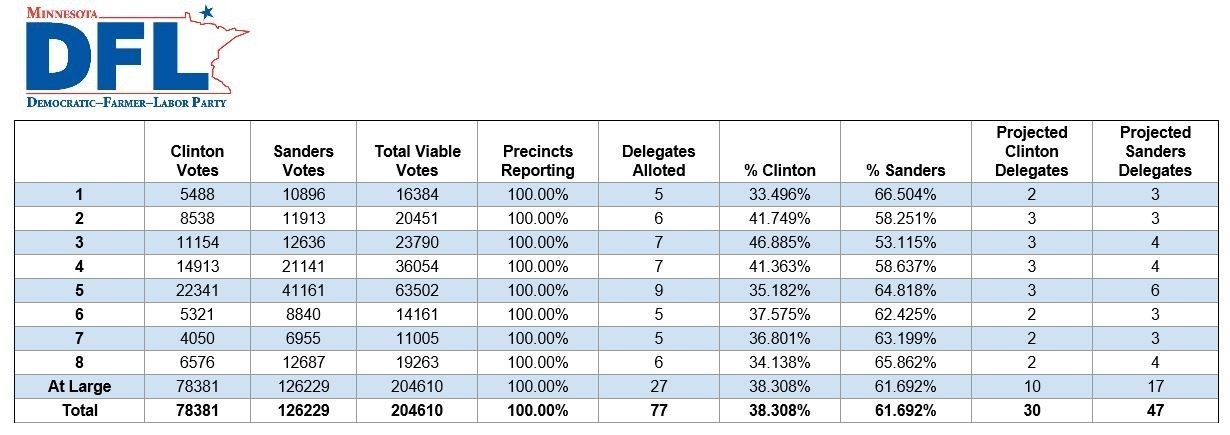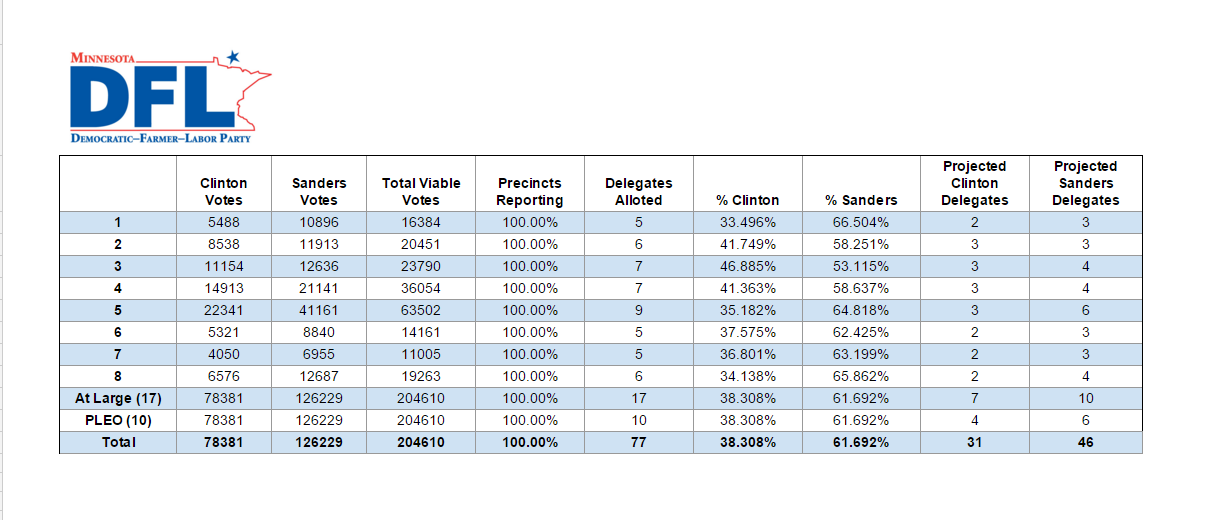- March 1
Super Tuesday: Minnesota Precinct Caucuses « Minnesota DFL Statements
Statement from Chairman Ken Martin on Precinct Caucuses
Final Results of 2016 Minnesota DFL Presidential Preference Ballot
“On Tuesday, Minnesotans gathered with their neighbors at 4,109 precinct caucuses throughout the state to cast votes for the presidential preference poll and participate in the business of building our party for the future.
“Turnout amongst DFLers was our second largest turnout in party history, as 206,078 people came out to cast a vote in this historic election. There were thousands of first time participants who showed up, waited in long lines, and made their voices heard because they were inspired by our candidates’ message for the future.
“The turnout we saw on Tuesday, which was almost double the turnout on the Republican side, is a reflection of the enthusiasm and excitement for our Democratic Presidential candidates, DFL candidates up and down the ballot, and the issues and values our DFL Party is fighting for each and every day. It is clear with the enthusiasm generated at our caucuses, that Minnesota will once again continue its longest-in-the-nation streak of voting for the Democratic Presidential nominee this November.
“I want to congratulate both of our Democratic Presidential candidates on the impressive campaigns they built here in this state and the positive issue-based debate they had about the future of our state and country.
“With 100% of the results now reported, Minnesota DFLers delivered a decisive victory for Senator Bernie Sanders on Super Tuesday. Senator Sanders was victorious in every Congressional District in this state which is a testament to the breadth of his support in Minnesota and his campaign organization.
“A humongous thanks to the 15,000 volunteers who helped run our precinct caucus locations across the state, and each and every voter who showed up and made their voice heard.
“The results below while 100% complete are unofficial until they are both verified with DFL Organizing Unit leaders and certified by the Democratic National Committee.”
Photo of Unofficial Results from 2016 DFL Caucuses (click to zoom):

March 4, 2016
Statement from the DFL
In the DFL’s certification process of the presidential preference ballots cast at the March 1st precinct caucuses, the Democratic National Committee (DNC) made us aware that there was a discrepancy in our delegate count. We were directed by the DNC to reconcile our count before certification. It’s been determined that Hillary Clinton has received an additional delegate from Minnesota.
On caucus night, we tabulated the 17 at-large delegates and 10 party leader and elected officials (PLEO) delegates as one group of 27 delegates. The two groups should have been kept separate. Each group is tied to the statewide results, however, they are two separate pools of delegates. When the delegate calculation is applied to the two separately, each group has a remainder delegate which goes to the candidate with the highest remainder. Clinton has the highest remainder in both cases and thus earns one more delegate.
Minnesota’s current delegate count now stands at 46 for Bernie Sanders and 31 for Clinton. Minnesota also has 16 super delegates who will take part in the Democratic National Convention in July. Those delegates are not bound by the presidential preference ballot results.
The party wants to thank the 15,000 volunteers who helped to conduct the precinct caucuses and the more than 206,000 attendees who took part.
Photo of Unofficial Delegate Allocation here (click to enlarge):
March 4, 2016
Statement from DFL Chairman Ken Martin on Presidential Primary and Superdelegates
In the days since the Precinct Caucuses there have been a number of questions swirling around with regards to my position on a Presidential Primary and additionally my role as a Super Delegate to the upcoming Democratic National Convention in Philadelphia this summer. There has been enough rumor, conjecture, and innuendo, which I wanted to clear it up so all of us can get back to building our Party to win and to last.
Presidential Primary
Even though there was a tremendous turnout at the Precinct Caucuses for both parties on Super Tuesday, it has become clear to me that the process by which we do our Presidential nominating here in Minnesota needs to be reformed.
Over 206,000 Minnesotans came out and voted in our Presidential Preference Poll but the long lines, short voting window, and shortages of ballots and registration sheets made for a very confusing and dispiriting experience. We’ve been told that there were thousands more Minnesotans who were so frustrated that they turned around and left without participating in the process. In addition, there were thousands more who wanted to participate but couldn’t because of illness, accessibility issues, or work related issues. That is no way to welcome people to our Party or to ensure that their right to participate is guaranteed.
I have reached out to legislative leaders in both parties to indicate my support for moving to a hybrid Presidential Primary system which ensures that those who want to vote in our Presidential nominating contest can do so in a more convenient manner throughout the day and via absentee ballot if they so choose. No one who wants to participate should have to jump through the extraneous hurdles of the current system.
That said, the DFL is widely seen as one of the strongest state parties in the nation; part of the reason is that we have a system that empowers the grassroots in the decision making of the party and the selection of candidates at all levels. I started in politics with Paul Wellstone and there is no doubt in my mind that if we did not have our caucus system he never would have been elected to the U.S. Senate. Primaries tend to favor the most established, deep-pocketed, candidates and incumbents. Our caucus system forces a more personal type of politics where our candidates and elected officials have to have conversations with the grassroots.
Another benefit of the caucus system is that it brings together neighbors to discuss issues and debate the direction our party should be heading. In this day and age of the internet and social media, people coming together in person to build community is a rarity. We should embrace a system that allows people to gather to build power around issues and influence our party leaders and candidates.
The hybrid model I am suggesting would establish a Presidential Primary conducted by the state of Minnesota to allow for easier voting. The results of that ballot, much like now, will bind the election of delegates to the national convention. One week after the Presidential Primary, the DFL would conduct caucuses and begin the normal party business of electing officers, debating resolutions, and electing delegates to the next level. We would change our rules internally to require anyone who wishes to be elected as a national delegate to have participated in both the Presidential Primary and the caucus process itself.
I believe that this system would ensure the broadest participation possible without disenfranchising people.
I have asked Vicki Wright, our Director of Training and Party Affairs, to convene a committee to look at ways in which we can strengthen our caucus system. We look forward to hearing many of the good ideas out there on how we can make sure our process is as inviting, accessible, fair, and open to all DFLers in the state of Minnesota.
Super delegates
Minnesota has 16 Super Delegates on top of the 77 elected delegates to the convention. These Super Delegates are not bound by the results of state caucuses or primaries and can change their vote at any time.
It is important to understand the history of the Super Delegates for context. During and after the 1968 Democratic National Convention in Chicago, there were a number of activists and advocates who felt that the convention composition favored the party elites – elected officials, party leaders, etc. – and that there was little to no voice of the grassroots at our party convention. Many reforms started to come to the forefront to create a more democratic system including the creation of the Super Delegates. Before Automatic Delegates came to be our elected officials and party leadership ran for delegate spots against regular convention attendees. More often than not these delegate elections were won by high ranking elected and party leaders thereby depriving the voice of ordinary, regular people at the National Convention. The reform to create Super Delegates was twofold: to create an automatic delegate pool so that elected officials and party leaders don’t run against grassroots, ordinary activists for delegate spot; and increase the delegate pool so that the vast majority, 85%, of delegates are elected directly by the people in caucuses and primaries throughout the country. The Super Delegates only make up 15% of the convention.
In the history of Super Delegates there has never been a time where the Super Delegates have gone against the will of the people. Never. In fact, in the most recent contested Presidential contest in our party in 2008, all of the Super Delegates swung their support to Senator Obama when he won a majority of elected delegates.
I have been very consistent about my position on this for many years now, as a Super Delegate I will support the candidate who wins the majority of delegates throughout the country. Once all states have had a chance to weigh in, I and many other Super Delegates, will support the will of the people. All of the Super Delegates are elected officials and as people who care deeply about the health of our Party, the last thing we would ever do is tear the party at the seams by voting against the will of Democrats around the nation. The number of Super Delegates a candidate has truly does not matter; the only number that truly matters is the number of elected delegates that one of our candidates has – whoever gets a majority will be our nominee in Philadelphia this July.
Lastly, for those who are deeply interested in the issues of Presidential Primaries, Super Delegates, and in general the DFL Party, I would encourage you to get involved. The Party belongs to those who show up and participate. If you want to be a part of a revolution than you need to do the hard work of showing up, rolling up your sleeves, and committing yourself to changing institutions, processes, and structures; voting one time is not enough. Our great grassroots caucus process allows your voice to be heard and change to occur; use it to make change.
I greatly appreciate the interest on process and I hope I have answered your questions, but now that I have please let’s get back to focusing on how we are going to win elections up and down the ballot this November. We have 249 days until one of the most consequential elections in our lifetime and the more we are focused on the internal process the less we are focused on communicating with voters about our DFL values and the candidates that represent them.

